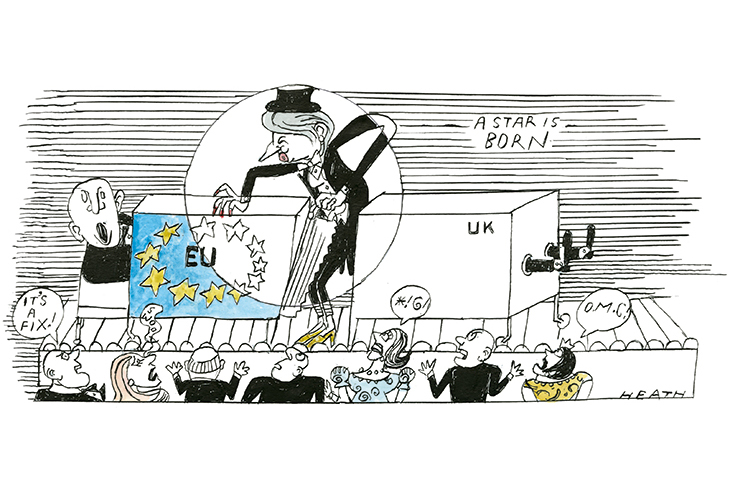Brexit was a mutiny. Like all mutinies, it was driven by anger at authority rather than by a strategy for the future. To date, the consequences have been to deepen polarization, but triumphant victory for either side is not the way forward. That there is no majority for any of the current options is entirely understandable: they are all awful. We can only break the polarization with a new strategy. The Brexit mutiny should have been a wake-up call. Instead, the elite are angry that the mutiny was not suppressed, while the mutineers have become ever more distrustful. There is a way out of this nightmare.
Why are all the Brexit options awful? There is no mystery: it is essential for ‘Brussels’ (aka ‘Germany and France’) that any form of exit must be sufficiently damaging to the UK so that no other country will leave. The tactical British mistake was to hand Brussels the power to inflict this damage. We did this by falling into the trap of unilaterally serving notice of withdrawal in accordance with Article 50. As it was designed to do, this strips the country that seeks to withdraw of its bargaining power, which rests on active participation as a member in the key centers of decision-taking. It was through our past intelligent use of this power that Britain was able to achieve negotiating triumphs such as exemptions from the euro and Schengen, the right for the City to become the main trading centre of the euro despite the UK not being in it, and uniquely, our budget rebate.
‘You don’t negotiate with a tiger while your head is in its mouth,’ says Churchill in Darkest Hour. He got our head out by lifting the troops off the beaches. We must use our sovereign right unilaterally to withdraw our Article 50 notification. Once withdrawn, our bargaining position will rapidly transform. In May a new European Parliament will be elected, and a new commission and president chosen. The major political currents in Europe will at last be working in our favor.
As Angela Merkel fades away, Sebastian Kurz will replace her as Europe’s most influential political leader. As the French and Germans bicker in disillusion, Italy and central Europe will seek to destabilize. We will find ourselves in the balance-of-power position that has been our forte for centuries. We can use this influence either to modify the EU into an enterprise that is more compatible with what our citizens want, or to quietly negotiate an agreed exit with other powerful countries, so that a subsequent Article 50 application would be precooked.
As an interim measure, we should aim to negotiate a belated seven-year transition arrangement to free movement. Although the EU will not reverse ‘free movement’, Britain is uniquely disadvantaged by our global language, by having abandoned our non-contributory benefits system, having deregulated our labor market, having dismantled our training system, and by our own folly in not using the seven-year transition option following the admission of eastern European countries that was taken up by everyone else. An appeal based on an admission of that folly would do much to rebuild relationships.
During that window, and regardless of whether we end up leaving or remaining, we need to address the root causes of the Brexit mutiny. We should restructure our benefits system, invest massively in training, and begin the task of rejuvenating our provincial economies. Half the population feels ‘abandoned’, the word hurled at me during a recent public lecture in Durham.
All healthy societies rest on the widespread acceptance of a dense web of reciprocal obligations among citizens. Underpinning this is a recognition of shared identity built through social interaction, common endeavors, shared history and shared futures, since this generates a presumption of fellow feeling. Psychologically, this is what citizenship of a healthy society means. For the less successful half of the population, such citizenship is a vital asset because with it comes the reassurance that the more successful half accepts obligations towards them. It is this confidence that has gradually been eroded, as the successful have peeled off from the shared national identity to self–congratulatory new spatial and class identities as ‘Londoners’ and ‘highly skilled’. Reversing a long period of convergence, for the past four decades the south-east of England has diverged from the rest of the country, and wage differentials have widened.
Immigration has gained prominence beyond its overall importance, because it has been used by elites to accentuate difference from others, compounding the fundamental loss of confidence in reciprocity. The metropolitan skilled condemn others as ‘racist’, yet there are sound reasons for the less successful to be wary of rapid immigration. Those immigrants in the bottom half of society are indeed competitors for the diminishing generosity of the successful. Even successful immigrants have ambiguous effects. Concentrated disproportionately in the south-east, they have few social connections with the provincial population who feel most threatened by abandonment.
Meanwhile, business claims smugly that ‘We need immigrants’. Business of course prefers cheap immigrant labor to paying higher wages to citizens; similarly, it prefers to recruit trained foreign labor than to spend money training young citizens. These are simply divergences of interest between business and society. The metropolitan commentator Janan Ganesh aptly, and brutally, captured London’s perspective on provincial England as being ‘shackled to a corpse’. No wonder those outside such smugness have lost confidence in the sympathy of their fellow citizens.
People have become impatient with the strident ideologues. As the waters break in the Labour party, the hour for pragmatism has arrived. Withdrawing our notice of departure is not a victory for Remain; it is equally a pragmatic masterstroke for Leave: the step to restore strength. It is the one action on which both sides, if they stop shouting and start thinking, could agree.
This article was originally published in The Spectator magazine.

























